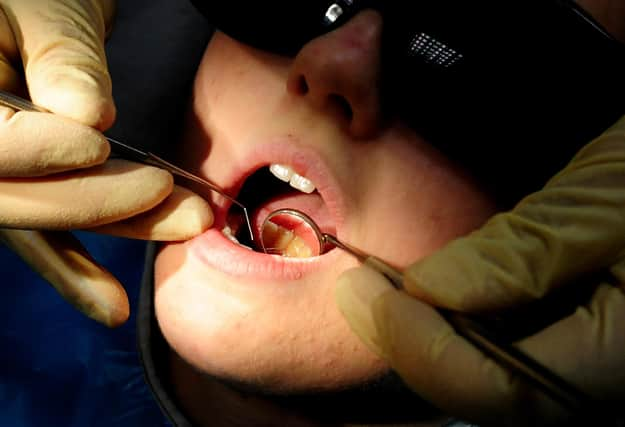Scottish dentistry costs: Hopes new payment system will save High Street dentistry, but it will cost patients


Dentistry chiefs are hoping the Scottish Government's new dental payment system will halt the loss of NHS dentistry in Scotland - but patients can expect costs to rise.
From November, the way dentists are reimbursed for their services by the NHS will change, in a bid to address the immense financial pressures dentists are facing post-pandemic, and the issue of retention and recruitment which are affecting all of the medical professions within NHS Scotland.
Advertisement
Hide AdAdvertisement
Hide AdEarlier this year, a survey carried out by British Dental Association (BDA) found more than half of Scottish dentists have already reduced the amount of NHS work they undertake.
The survey revealed 59 per cent have reduced their NHS work, but 83 per cent said they are planning to reduce NHS work within the next year – meaning less High Street dentistry available for NHS patients.
Meanwhile, just one in five (21 per cent) of dentists said their practice has returned to pre-pandemic capacity, with a majority (61 per cent) citing recruitment problems as an issue.
The BDA’s Scotland director, Charlotte Waite, explained that much like other NHS sectors, dentistry has been hit hard by the pandemic.
“Coming out Covid, we have this big backlog of care,” said Ms Waite.
“About a year’s worth of NHS dentistry was gone. When people come along, they need more work doing, which impacts on the next person coming along.
“That’s having a big impact on the amount of NHS work dentists are getting through.”
On top of this, a whole cohort of trainee dentists were unable to qualify because they could not fulfil the practical aspects of their training during the pandemic.
Advertisement
Hide AdAdvertisement
Hide AdFewer dentists are coming from abroad to work in the UK too. According to the NHS Scotland dental workforce report 2021, there were also reduced intake targets to BDS courses in 2021 and 2022, meaning that six years on, there will be fewer dentists entering the profession.
The new payment system is an attempt to reverse some of these trends.
Currently, dentists are reimbursed for services using ‘Item of Service’ payments - essentially codes that relate to certain services, which dentists use to send itemised, monthly invoices to the NHS. There are around 700 of these codes.
The new system, due to come into operation on November 1, has just 45. The Scottish Government claims the updated system will “drive greater consideration of patients’ specific oral health needs, with more focus on patient-centred care such as preventative periodontal – gum disease – treatment”.
However, the government has warned that “patients that are required to pay a NHS charge are likely to see an increase in costs”. Patients pay up to 80 per cent of the cost of treatment, up to £384. Around 40 per cent of Scottish dentistry patients are exempt from paying.
The SNP manifesto ahead of the 2021 election included a pledge to abolish “all NHS dentistry charges”, with the rollout to start with the exemption of those aged under 26 from paying for treatment.
The reforms also include an additional £10m from the Scottish Government to support the delivery of laboratory-based treatment items, such as dentures - which under the current payment system some dentists provide at a loss.
“Recruitment and retention is a problem,” said Ms Waites.
“It was previously just an issue in rural areas, but now it’s across the board.
Advertisement
Hide AdAdvertisement
Hide Ad“It’s important this new payment system will retain dentists in the NHS, because once they’re gone it’s hard to get them back.
“Things like denture work were being delivered at a loss. The NHS wasn’t covering the cost, and that clearly isn’t sustainable.
“Within the new payment system, some of the items relating to laboratory work have gone up.
“The hope is that the reform will retain dentists in the NHS system. The other thing that is important is to recruit new dentists in and retain them.
“The high volume, low margin model is not attractive to young dentists and the work they want to do.”
Ms Waites added: “NHS charges can be a barrier to care when people are in the middle of a cost of living crisis, but the level of NHS patient charge is set by the Scottish Government.
“The SNP’s election manifesto said that NHS dentistry will be free for the whole population of Scotland.”
The Scottish Government’s public health minister, Jenni Minto, said: “This new NHS offer improves the system for both dental teams and patients and is the first step in the process to make the services available on the NHS reflect the changing oral health needs of the population.
Advertisement
Hide AdAdvertisement
Hide Ad“It also reaffirms our commitment to the sector and to all NHS patients in Scotland.
“We are confident that the modernised system, with increased clinical freedom for dentists, will provide longer-term sustainability to the sector and encourage dentists to continue to provide NHS care.
“All patients will continue to receive free NHS dental examinations and I want to reassure those who are exempt from NHS dental charges – including children and young people under 26, and those on certain benefits – they will continue to receive free care and treatment.
“People on a low income are also eligible for support, details of which can be found on NHS Inform.
“I’d like to take this opportunity to thank all NHS dental teams for their continued engagement and commitment to NHS dentistry.
“Increased costs for energy and the cost of living crisis still pose challenges for them but we will continue to work together to ensure the best quality of care is available.”
Comments
Want to join the conversation? Please or to comment on this article.